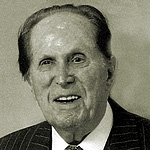Unlike most of the respected names in American music publishing, Julian Aberbach was born in a foreign country, Austria, emigrating to America and arriving in time to serve in World War II. He underwent basic training in the U. S. Army in Spartanburg, South Carolina, later receiving his commission as a second lieutenant and assignment to Fort Benning, Georgia as a multi-lingual liaison with officers of the Free French who were stationed there.
During his service in the two southern cities, he first became interested in country music, which was the major source of entertainment in the south. He also came to view the music as a potentially highly profitable component of American popular music.
Following his discharge from the Army, at the close of the war, he headed west to Los Angeles which had become established as the entertainment capital of the nation, and where he felt he should start his career In music.
In Los Angeles, Aberbach soon discovered a fiddle player, Spade Cooley and His Western Swing Band, playing to capacity crowds on the Venice Pier. “It was country music,” Aberbach has recalled, “And I knew it was going to be big!” Aberbach made a deal to represent Cooley’s song, “Shame On You,” for three years for $1,500, and he was on his way. The song was issued as a single by Columbia Records and soon hit number one on the country charts.
Another song, soon acquired by Aberbach, “Detour,” was recorded first by Cooley and Leslie Tuttle and then by Patti Page, whose version hit number one. He also made the acquaintance of the then renowned Bob Wills and his band, The Texas Troubadours. The first Bob Wills song for Aberbach’s publishing activity “Stars and Stripes on Iwo Jima,” immediately took off.
Soon, Aberbach was flying every weekend to Nashville, where within a very short time, he negotiated contracts for publishing with a number of the major names in Nashville music and the Grand Ole Opry, such as Red Foley, Ernest Tubb, Johnny Cash, Eddie Arnold, Bill Monroe, Left Frizzel and Hank Snow. For at least a decade thereafter, Aberbach’s company, Hill and Range Songs, accounted for close to 75 percent of the country music hits.
A brother, Jean Aberbach. who had been working for Max Dreyfus, the world’s top music publisher, soon joined Julian in the business which then had offices in both Los Angeles and New York. The pair traded places every three months, meeting en route in Chicago where they compared notes.
One of the most significant publishing deals ever made by Aberbach was the acquisition of the exclu? sive publishing rights to the music of Elvis Presley in 1955. It all came about through Hank Snow, a country artist he had met in Los Angeles. Aberbach had gotten Snow a job at a radio station in Texas and then a contract with RCA Records. When his first RCA record, produced by the veter? an music man Steve Sholes, “I’m Moving On,” went right to number one, Snow was signed by The Opry and became a superstar. Snow was the one who first tipped Aberbach off to “a new kind of country singer, Elvis Presley.” He flew to Shreveport, LA to have a look at an Elvis concert and he was convinced. This indeed was a superstar in the making. Eventually by meeting Presley’s family and helping another friend, Colonel Tom Parker become his manager, Aberbach set up a deal in which the rights to the publishing profits were to be split with Elvis, 50-50.
By the early ‘70s, the Aberbach’s business had become a worldwide music force, with offices in London, Paris, Amsterdam, Hamburg and Rome. And, at that time increasingly distressed with his perception of rising crime in New York, Aberbach moved his family to Paris. Shortly thereafter, while on a business trip to New York, he suf? fered a near fatal heart attack. He was hospitalized and on the critical list for six weeks. When brother Jean Aberbach decided in panic to sell the company, Julian has recalled, “Sick as I was, I told him to keep 25 percent of the 3500 songs then being administered by Warner Bros., 50 percent of the Elvis Presley music and all of Hank Williams.” It was a decision he never regretted.
Now 91, Aberbach divides his time between homes in Southampton, NY, Palm Beach and Paris. He also spends considerable time being proud of his five grandchildren, four of whom are distinguishing themselves at Southampton High School, while a fifth, Chloe, now four, “is on her way to Hollywood.”
Although he lost his brother Jean, in 1992, he remains devoted to his wife of 46 years, Anne-Marie, assuring everyone that, “She is still very beautiful and we are still talking quite vividly to one another!”


